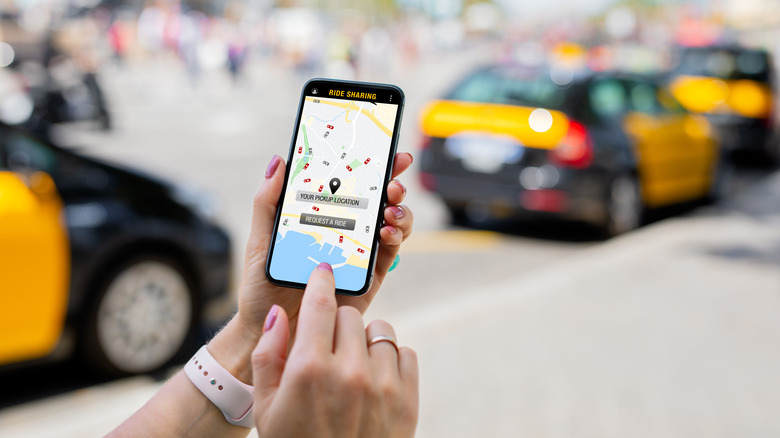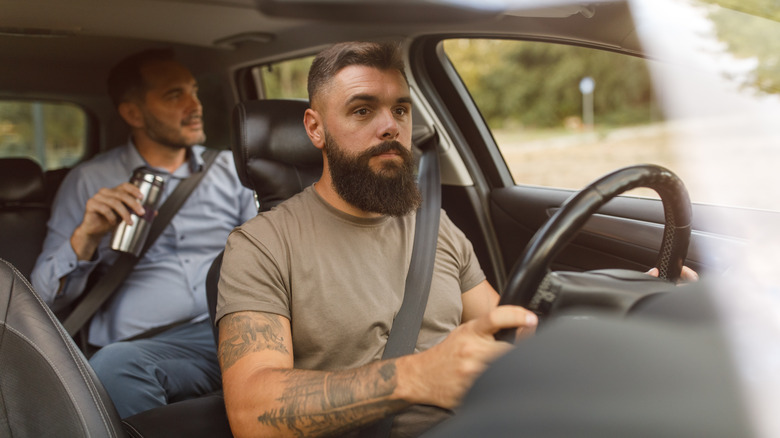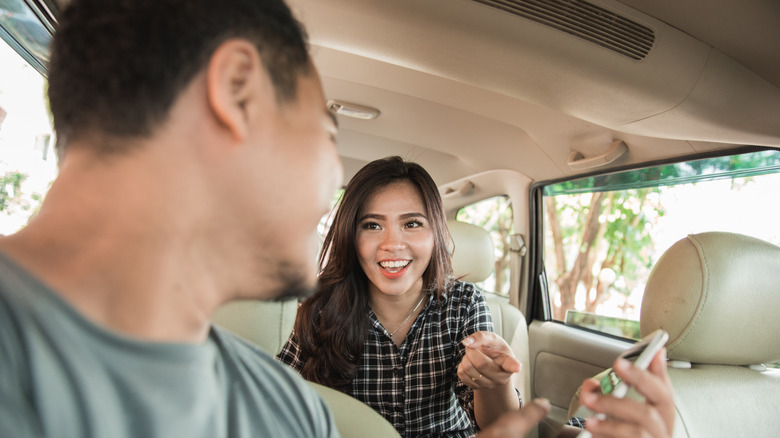The Sneaky Dangers Of Ride-Sharing Apps Like Uber
While "uber" was once just a word borrowed from the German language, most of us now associate the term with the ride-sharing app available in over 70 countries across the globe. Uber is often the easiest — and cheapest — way to return to your accommodation after a long day of sightseeing or a late night out. In fact, ride shares are even more commonplace than taxis in destinations like New York City, according to CNBC. And it's not just Uber — Lyft, Bolt, and other ride-share apps are making it easy for travelers to hail a ride wherever they are. However, the model behind these services, where independent contractors are recruited to transport passengers, can pose some safety concerns. Uber revealed in a U.S. safety report published in 2022 (pdf) that while over 99.9% of rides go off without a hitch, that still leaves a small fraction that results in a safety violation.
For starters, ride-share apps collect private information to complete trips, including users' locations (which could be tracked even when you're not booking a car) and social media accounts. Then, on apps like Uber, the driver can see a passenger's first name, pick-up point, and drop-off location, which could be easily stored or recorded during the trip. That means a dodgy driver might remember your name and, for instance, the address of your Airbnb. And unfortunately, those are just a couple of the risks associated with relying on ride shares.
Thousands have been victims of traumatic assaults and even death
The worst thing that could happen when you take a ride from an app isn't a traffic jam or even a misunderstanding about your destination — it's getting hurt while traveling from point A to point B. In Uber's safety report, the company tallied 998 incidents of sexual assault in 2020 and an even greater number (2,826) the year before, when the COVID-19 pandemic hadn't yet limited people's movement and travel. Though sexual assault is a horrific crime that can happen anywhere, including in a traditional taxi, some have argued that a lack of regulations and faulty background checks on ride-share apps make them even more dangerous.
The safety report also included data on deaths resulting from physical assault. Between 2019 and 2020, 20 fatalities were attributed to a physical attack during an Uber ride. Of those deaths, five were Uber drivers, and 15 were riders whom a third party or fellow passenger assaulted. It's worth noting that some apps allow passengers to share their ride with a stranger, such as in Uber's UberX Share feature, to save money and potentially snag a booking sooner. However, it's unclear if these types of rides played a role in Uber's recorded assaults.
How to stay safe when using a ride-sharing app
Despite the potential lack of privacy when using ride-sharing apps or even Uber's statistics on sexual and physical assaults, these services don't always spell trouble for passengers. In fact, a survey by Alarms.org found that women feel safer in Uber and Lyft than in standard taxis or on public transportation. On the other hand, the survey also discovered that 23% of female respondents had to report an Uber driver who made them feel uncomfortable, and 15% said the same for Lyft drivers.
To stay safe during your next trip, take action before your driver arrives at your pick-up spot. Tell a friend about your journey, and reject drivers with poor app ratings if you're alone. Choose locations not specific to where you'll be staying when possible. For example, if you need to be picked up at your hotel or short-term rental, set your pick-up address to a building next door or across the street. "It's never a good idea to let strangers know your exact address," Uber driver Chelsea Burton advised Huffpost. "If the weather is good enough and you feel safe, why not just have yourself dropped off a block away?"
When the driver shows up, ensure the license plate matches the one on the ride-share app and compare the driver's face to their photo. For extra precaution, ask the driver to confirm who they're picking up (but don't provide your name until they've said it first). Then, stick to the backseat to maintain your personal space.


